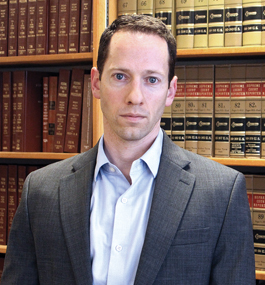Laying Down the Law

Brian Klotz
Matthew Segal ’99
Matthew Segal ’99 is in full battle mode. He has to be.
The legal director of the American Civil Liberties Union of Massachusetts and his staff are confronting what they view as an unprecedented wave of challenges to civil liberties from the Donald Trump administration.
“We feel like we’re in the fight of our lives,” he says.
Segal has emerged as a leading defender of freedom in complex civil-liberties cases. Earlier this year, in the wake of President Trump’s January executive order imposing a travel ban on immigrants from seven Muslim-majority countries (later reduced to six), he argued on behalf of the plaintiffs in Louhghalam v. Trump before the U.S. District Court for the District of Massachusetts; the court placed a temporary stay on the ban.
He also wages campaigns on the state front. In April, Massachusetts overturned a record 21,839 wrongful convictions resulting from evidence tainted by former Boston drug-lab chemist Annie Dookhan. It was the culmination of advocacy Segal had been working on since joining the Massachusetts ACLU in 2012.
With success comes a rising profile. The New York Times quoted Segal frequently in its coverage of the recent trial of Michelle Carter, a Massachusetts teenager ultimately convicted of involuntary manslaughter for encouraging her boyfriend via text messages to commit suicide.
Segal’s passion for the law developed at Brandeis, where his parents, Donald and Risa, both ’69, met and married. Like his mother, Segal took sociology courses with Professor Gordie Fellman. “He helped me understand how social structures influence people’s behavior, and how the law is the most important of these,” Segal says.
After Brandeis, Segal attended Yale Law School, then worked as a public defender — solid preparation for the many uphill battles to come. “In civil rights work, more often than not, your opponent has more power and resources,” he notes.
Though executive orders like the travel ban can be disheartening, Segal says, he sees hope in the many protests against the ban. “They showed the power that people have to fight back,” he says.
— Brian Klotz
